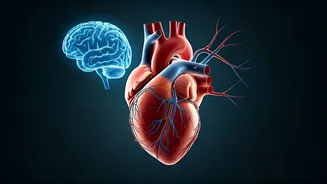The Vital Connection
The brain, the body's command center, depends heavily on a constant supply of blood, oxygen, and nutrients to function correctly. The heart, acting as
the body's primary pump, plays a crucial role in delivering these vital resources to the brain. Cardiovascular health and brain health are intricately linked. When the heart functions well, blood flow to the brain is optimized, ensuring cognitive functions like memory, focus, and reasoning are at their best. Conversely, problems within the cardiovascular system, such as high blood pressure, atherosclerosis (plaque buildup in arteries), and other heart diseases, can restrict blood flow to the brain, which leads to cognitive decline and heightened risks of dementia. Therefore, maintaining a healthy heart is crucial not only for physical well-being, but also for preserving mental acuity and longevity. Regular cardiovascular health check-ups and lifestyle choices are thus vital in fostering a healthy brain.
Heart Tests and Dementia
Recent research has begun to investigate the potential use of heart tests as tools for assessing the risk of dementia. Certain heart conditions can act as indicators that signal potential problems within the brain. For instance, studies indicate that conditions such as atrial fibrillation (an irregular heartbeat) or signs of atherosclerosis might correlate with a greater likelihood of developing dementia later in life. This concept is revolutionary because it suggests that assessing heart health could offer an early warning system for cognitive decline, perhaps even decades before the onset of noticeable symptoms. Using heart health markers to predict and possibly prevent dementia is becoming a significant focus of current research. As scientists continue their work, new insights into how these early indicators might enhance dementia diagnosis and treatment are emerging.
Early Risk Detection
The potential to detect dementia risk years before symptoms begin presents a significant advancement in preventative care. Traditional methods of diagnosing dementia often rely on observing the patient's symptoms, which usually appears relatively late in the disease's progression. By utilizing heart health assessments, doctors might be able to identify individuals at high risk much earlier. This early detection opens up opportunities for implementing lifestyle modifications, such as changing diet, increasing physical activity, and making use of other interventions to potentially slow down or prevent cognitive decline. The ability to identify risk factors in their early stages enhances the opportunities for early intervention strategies, thereby impacting the quality of life and potentially delaying the onset of debilitating symptoms. This proactive approach underscores the value of regular health check-ups and a holistic view of well-being, where heart health and brain health are seen as closely connected.
Preventative Strategies
Recognizing the connection between heart health and brain function emphasizes the value of preventive strategies. This is crucial for maintaining both physical and cognitive well-being. Several lifestyle changes can positively impact both heart and brain health. These include following a heart-healthy diet rich in fruits, vegetables, whole grains, and lean proteins, and low in saturated and trans fats. Regular physical activity, such as brisk walking, jogging, or swimming, which improves cardiovascular function, is highly beneficial. Moreover, managing stress effectively, getting adequate sleep, and keeping the mind active through learning and engagement in mentally stimulating activities, like puzzles and reading, are also extremely valuable. By implementing these lifestyle adjustments, people can take proactive steps to nurture both their heart and brain health, decreasing the possibility of cognitive decline and promoting a higher quality of life. Regular health check-ups and consultation with a healthcare professional are important for making individualized plans.















